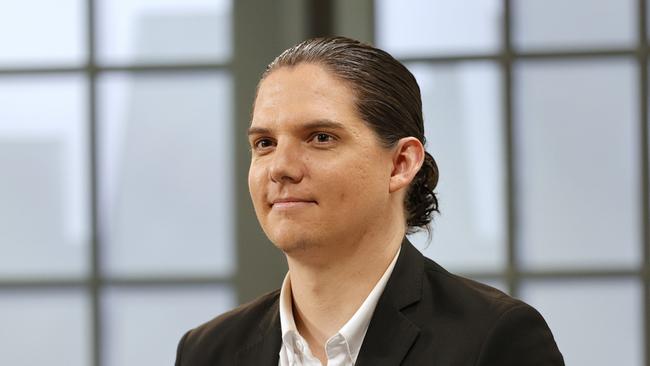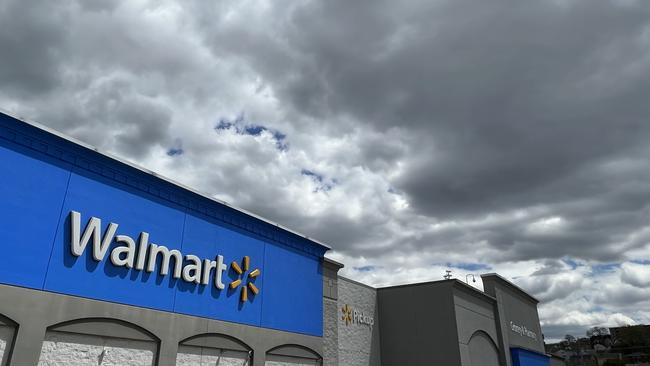The activist who is hunting down ‘woke’ companies
Corporate America is worried. US campaigner Robby Starbuck makes firms drop diversity policies by threatening boycotts. Who’s next on his list?

Robby Starbuck is a capitalist at war with corporate America. From his farm in Tennessee, the 35-year-old activist is going after American companies that he believes are prioritising the agenda for diversity, equality and inclusion over the conservative values of their customer base.
This year he has declared victory over some of the country’s biggest businesses, including Harley-Davidson, Tractor Supply and Walmart, that have all rowed back on diversity, equity and inclusion (DEI) initiatives after Starbuck threatened customer boycotts if they did not.
He calls it hunting. “It’s sort of like, if you’re a predator in the wild, right? You’re going hunting. You want to catch them alone. You don’t want to go after the whole pack, because you’re in much more danger then, and it’s very hard to have a successful hunt. But if an animal goes after a wounded animal, one on one, you’re going to take it down.”
His strategy involves months of investigating companies with a team of researchers and volunteers. Often, he says, the information is shared by whistleblowers.
He then approaches the companies for comment and clarification before posting videos of less than 10 minutes on X in which he describes the allegations and calls on customers to boycott the businesses until they scrap their DEI agendas.
Tractor Supply, a big farm supplier, caved within three weeks of Starbuck’s first campaign launch in June.
Walmart, his biggest scalp, backed down before the video was even released in the run-up to Black Friday.
This month the Japanese carmaker Nissan said it would row back on diversity schemes at its American business following pressure from Starbuck.
Corporate America is worried. Starbuck has not revealed which companies are next on his list. He let slip last month, however, that he is building a dossier on Amazon.

Starbuck is not ready to go public with his accusations about the company and says he has not been approached by it yet, but he says Amazon employees have been peeking at his LinkedIn page. Amazon declined to comment.
Wearing a suit and cowboy boots at his family home in an affluent neighbourhood south of Nashville, Starbuck expounds on a psychological phenomenon called the “mere exposure effect”.
He says: “If seven times in a row I give you seven different exposures to a company, and they’re all negative, you’re at least much more likely to have a very negative view of that company. And so what we do is very cognisant of those concepts.”
The climate has changed in America since companies, acting with laudable intentions, went all in on DEI after the murder of George Floyd by a Minneapolis police officer in 2020. Four years later critics have begun calling out companies spending millions of dollars on DEI initiatives that they believe exclude some groups of employees and customers.
A US Supreme Court ruling in June last year found it unconstitutional to consider race in university admissions. Companies have interpreted the ruling as a direction that they could no longer use race as a proxy for disadvantage and instead must find candidates who represent all types of diversity.
Starbuck argues that Floyd’s death paved the way for the “furthest-left activist” within companies to take advantage of executives’ fears of being perceived to be racist by encouraging them to form a DEI office and donate money to certain causes. His message to chief executives? “You fed these radicals, and now they want more.”
DEI policies are bringing inappropriate social issues and politics into companies, he argues. Examples of initiatives he rails against include clubs based on sexuality, such as LGBT groups.
“In the office, you have the separation of employee resource groups by race and by what type of sex they like to have. It’s so weird because, if you went and got a job anywhere in the ’90s or the early 2000s and you went to your boss and said, I’d like to form a club centred on what type of sex I like to have, you would have been probably fired for sexual harassment, and probably rightfully so, because I think really, people’s sex lives don’t belong at work.”
His response to critics who say that he is homophobic? “It has nothing to do with the fact that it happens to be LGBTQ groups. If there was a straight group predicated on the fact that they like to have straight sex, I would think that’s weird too.”
Starbuck was a Hollywood producer and director working with famous actors and musicians while raising a family in California when he first heard about the concept of DEI. His eldest daughter, then seven years old, came home from school and said an external speaker had taught her class about “white privilege”.
Starbuck, who is Cuban-American, had never heard of the concept but started researching it after his daughter said she had been advised to never sit in a lunch group without a minority present.
“I knew all of these kids ever since they were little,” he says. “So I can say with 100 per cent certainty these kids had never thought about what race each other were previous to that, with the exception of just the simple recognition that, oh yeah, you’re that or this.” He says he will never forgive the private school for “introducing the divisive concept of saying, ‘let’s treat each other differently’”.
By 2016 the school, which boasted a host of celebrity parents but cannot be named for legal reasons, had become “politically radical”, Starbuck said.
“Trump decided to run for president and everybody lost their minds at the school. That was when I knew this was going to be a problem and I knew it was going to go into corporate America.”
He has since swapped working with Natalie Portman and Snoop Dogg for full-time crusading against DEI. He is joined in battle by his wife, Landon, a musician and campaigner. They have four children together.
The family home is surrounded by 12 acres of land where they look after chickens, cows and greenhouses as they seek to reduce their reliance on “woke” companies. Starbuck says he supports his family financially with successful investments, including in the stock market.
His campaigns are funded with the help of $US5 monthly X subscriptions and streaming revenue from The War on Children, a film he made with his wife which argues that a far-left cultural revolution is attempting to destroy America by exposing children online and in shops to radical ideology, sexualisation and transgenderism. Fans of the film include Elon Musk.
Starbuck says he mostly gets positive responses to his campaigns from the American public. About 95 per cent of the mail he receives is “extraordinarily positive” and includes messages from “thankful” employees at the companies he has targeted. Of the 5 per cent or so of correspondence that is negative, about 1 per cent has included death threats.
In recent weeks Starbuck says he has been fielding calls from Republican nominees from different departments, who want his ideas about “how you get rid of this stuff”.
During Donald Trump’s second presidency, the justice department and other federal agencies are expected to start investigations and bring lawsuits over DEI policies by arguing that many of those violate anti-discrimination laws.
When does the battle end? “I’m gonna have to feel reasonably certain that we’ve run over DEI, we’ve reversed back over it again, and then we’ve run over it one more time,” Starbuck says.
“We’re really going to have to know that it has taken such a beating that it is not going to rear its head in the short term and that in the long term it would have a very difficult time ever surviving in an environment that is anything like this.”
The companies rowing back on DEI after Starbuck pressure
Harley-Davidson
On July 23 Starbuck declared on X: “It’s time to expose Harley Davidson.” With an accompanying nine-minute video, he accused the renowned motorcycle manufacturer of a series of “woke” initiatives, including openly working to have fewer white suppliers, sending white male employees on a diversity program and hosting LGBT events at the corporate office. Starbuck encouraged customers who were not aligned with those beliefs to spend their money elsewhere.
Harley-Davidson did not initially respond to the allegations but on August 19 it backed down. In a statement, it said that in the future employee training would be absent of socially motivated content. It also said it had ditched its supplier diversity goals and would no longer participate in rankings by the Human Rights Campaign, an LGBT advocacy group. “We are saddened by the negativity on social media over the last few weeks, designed to divide the Harley-Davidson community,” the company said in a statement. “We believe having both a broad employee and customer base is good for business and that ultimately everybody should experience the joy of riding a Harley-Davidson.”
Tractor Supply
Based in Tennessee, it sells farm equipment, pet and animal feed, clothing, tools and fencing to farmers, ranchers, homeowners and gardeners. The company operates about 2200 outlets across America and has a market capitalisation of nearly $US30 billion. On June 6 Starbuck posted a seven-minute video on X calling on the retailer’s conservative customer base to boycott Tractor Supply until it ditched DEI policies including “LGBTQIA+” training for employees, Pride month decorations in the office and climate change activism. The video received more than two million views.
Less than a month later the company announced that it would eliminate DEI roles, stop sponsoring Pride festivals and withdraw from carbon emission goals. Instead it pledged to focus more on “rural America priorities” including education, animal welfare, veteran causes and being a good neighbour. “We have heard from customers that we have disappointed them,” the company said in a statement. “We have taken this feedback to heart.”
Walmart
Starbuck’s latest scalp is the world’s biggest retailer. In early November Walmart was contacted by Starbuck, who had amassed a dossier of concerns about its DEI policies, and threatened to release a video calling for a boycott of the business just before Black Friday.
Before the video was released, on November 18, Walmart said it would reverse some of its DEI initiatives.
Those included no longer considering race and gender to boost diversity when granting supplier contracts and winding down the Centre for Racial Equity, a non-profit organisation awarded $US100m of funding by Walmart in 2020 for five years. The retailer also pledged to end some racial equity staff training and has agreed to review its support for Pride events and withdraw from rankings by the Human Rights Campaign, an LGBT advocacy group. Walmart also said it would monitor online merchants for sexual or transgender products marketed to children and remove items where deemed necessary.
The Times


